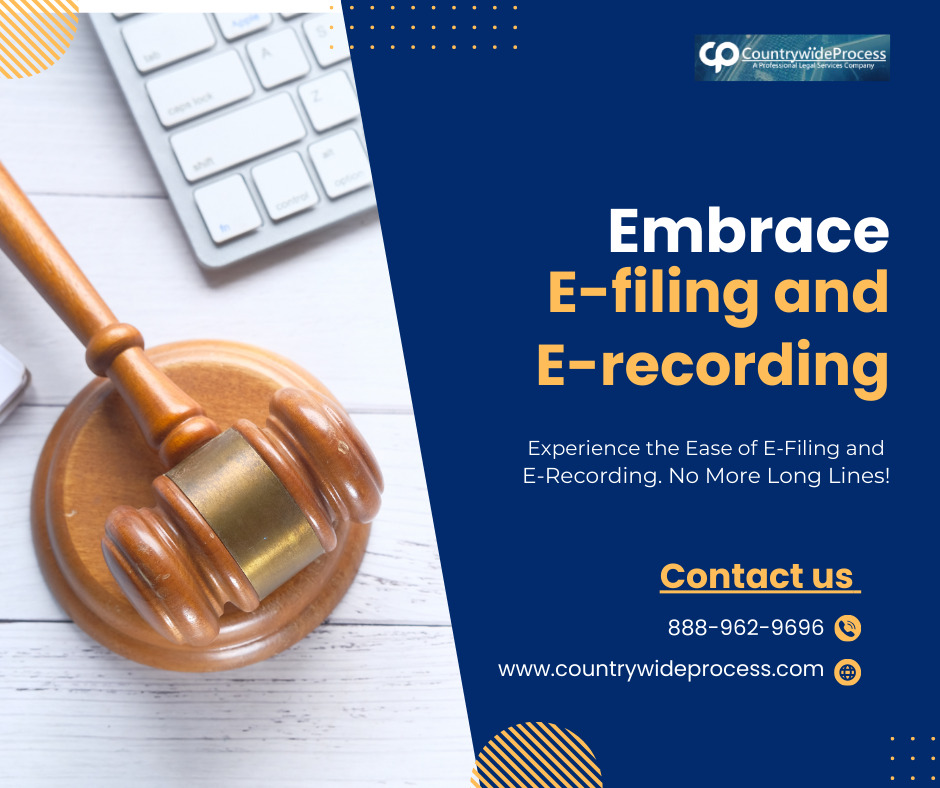Going online is now a common practice in a growing number of fields, and legal and bureaucratic fields are no exception. Online services for e-filing and e-recording cases and documents have evolved into an integrated technology solution that is currently transforming the means by which citizens transact with the legal system.
Thus, by opting for these internet opportunities, people and companies can benefit in many ways while avoiding time consumption, associated costs, and other frustrations.
The Time-Saving Advantages of E-filing and E-recording
The benefit most commonly associated with e-filing and e-recording is flexibility, which means the most to any fee earner. Today, one cannot talk about the inefficiency of bureaucratic services, where thousands of people have tried to collect tons of papers and stand in queues in governmental offices.
Tax services can be filed online anywhere at any time of the day through e-filing, whether it is legal documents or other official papers that are deemed necessary to file.
Likewise, e-recording enables one to record documents for official recording through the Internet instead of physically going to the recording office. This is a factor that makes it simple for clients to attend to legal and bureaucratic responsibilities at their convenience.
It is worth noting that other benefits to filing and recording go beyond simply not having to make physical trips. These online filing systems include interfaces that help the user with the procedures to follow to file on the system.
Most e-filing systems have features for identifying errors and pre-inputting data to minimize the occurrence of mistakes in document filing. This saves time and prevents delays or rejections due to incorrect paper filings.
Enhanced Efficiency: Streamlining the Legal Process with E-filing and E-recording
E-filing and e-recording clearly benefit not only individuals but also the entire legal system. They accelerate the flow of documents, thus reducing situations where one has to key in data from a paper document.
This means that filers and the agencies that review filings receive the e-filing documents and information within a shorter duration. For instance, electronically submitted tax returns take a significantly shorter time than manually submitted tax returns, meaning that refunding to taxpayers is faster.
Moreover, filing and recording result in preparing all the filed documents in a format that is easily viewable as electronic records. It reduces paperwork by ensuring that all documents do not get lost or misplaced in the process, which can be a major problem for paper-based systems.
Documents are saved electronically through filing and recording; therefore, when there is a need to check documents, physical movement is not required. It also helps demystify the law while promoting accountability and transparency throughout the entire process.
Cost Savings and Environmental Benefits: The Added Value of E-filing and E-recording
When it comes to benefits, e-filing and e-recording have it all: the primary benefit is, of course, a drastic decrease in costs for both citizens and the state. It is estimated that traditional filling activities cover a large expenditure in terms of paperwork, printing, stamps, emails, faxes, and physical transportation.
By going electronic, these costs are significantly reduced, as has been indicated in the points above. It eliminates the need for people to buy paper, ink, or stamps and, at the same time, reduces the governmental agencies’ operating costs in terms of administrative overheads and physical storage facilities.
Additionally, they avoid utilizing the services of professional filing agencies by implementing e-filing. This practice also lowers user expenses. These agencies typically offer to file and process papers within courts and other related bodies, a service that incurs monetary charges. This service is unnecessary because papers can be filed online in the required formats. This makes the legal process more affordable to the public since they can access it without having to pay much cash in filing fees.
On the other hand,filing and recordingsave money and are environmentally friendly.For instance, the legal industry, which heavily relies on paper, is a major contributor to deforestation and poses a significant environmental threat.
Computerized circulation reduces paper usage, which ultimately aids in the preservation of natural resources. The practice of embracing digital documentation can be said to be in line with contemporary society’s concern for environmental conservation. The fact that it is an environmentally friendly practice also plays a role in an individual or organization’s decision to opt for e-filing in the current and possibly expanding economies.
This is because paper usage demands energy not only to be harvested for production but also for transport and eventual disposal. This has a positive impact on reducing carbon emulsions and goes a long way toward supporting the e-filing initiative as being environmentally friendly. Furthermore, the use of such electronic systems allows for a reduction in the legal industry’s impact on the natural environment.
Conclusion
Therefore, e-filing and e-recording stand as big successes that show an improvement in the way society handles its legal matters. These online systems present a number of opportunities, such as being time-saving, accurate, cheap, and friendly to the environment.
On the other hand, as technology advances, e-recording and filing are likely to expand their cubicles and become the norm for filing and recording documents in the judicial system. These technological advances thus foster a more efficient, effective, and user-friendly legal process for all stakeholders.





